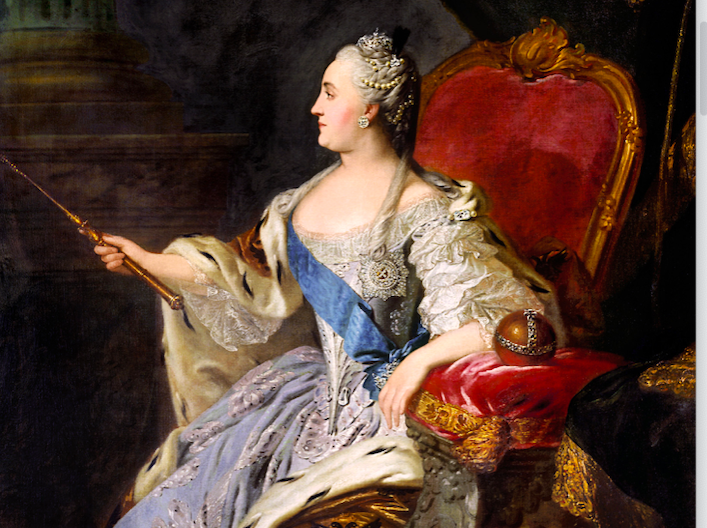On May 12th, Hulu dropped season three of the Emmy-winning, period-piece dramedy The Great, starring Elle Fanning and Nicholas Hoult. The show follows Catherine the Great as she arrives in Russia to be married off to the boorish, narcissistic heir to the Russian throne, Peter III. A cheeky introduction at the top of each episode makes it clear to viewers that the show is only “an occasionally true story.” But, what it lacks in cold, hard, facts, it more than makes up for in whip-smart humor, entertaining debauchery and magnificent costuming.
In real life, Catherine the Great was born Princess Sophie of Prussia in 1729 and managed to eventually steal the throne, becoming the longest-ruling empress of an entirely different country to which she had no actual claim. Hulu’s The Great toys with the historical details of this incredible tale, but there are a few things they pull straight from the history books. Here are five fascinating facts about Catherine the Great that The Great gets right:
She really did stage a coup and usurp her husband’s throne.
The real Catherine the Great did indeed successfully stage a bloodless coup and steal the throne from her husband Peter III. This is the major plotline of The Great’s first season, where the audience watches Catherine realize her husband is a certified idiot, and that she is much better suited as leader of Russia.
In real life, Peter III held his seat as Emperor for only six months before abdicating the throne to Catherine. Peter suspiciously died in jail eight days after the coup due to what was ruled a “hemorrhoidal colic,” but his sudden death birthed rumors of assassination. There is no proof Catherine knew about any plot to murder the former emperor.
Catherine the Great was known for her dedication to the arts, sciences, and philosophy.
The real empress’ own art collection was so expansive that it eventually became what is now the second largest art museum in the world, the State Hermitage Museum. During her reign, Catherine also commissioned many artistic and cultural projects, campaigned for a new and improved education system, and even kept in touch with the famous philosopher Voltaire. She also founded elementary schools, libraries, and other educational institutions. She was known at the time and remembered by historians as an enlightened leader.
The Great uses this fact often, as we see Fanning’s Catherine meeting resistance from nobles and advisors over her progressive ideals—especially her plans to abolish serfdom.
She inoculated herself with smallpox and encouraged the Russian people to do the same
Catherine was known to be an early proponent of inoculation against smallpox, just like viewers see in episode seven of the first season of The Great.
The real empress and her son were some of the first people in Russia to be inoculated against the disease, which involved making an incision on the arm and placing small amounts of smallpox pustules into the open wound. This exposes the person to the virus so their bodies can fight it off later. Her willingness to undergo the inoculation before the public was respected by many and likely inspired more Russians to get themselves inoculated, too.

Catherine the Great by Fedor Rokotov via Wikimedia Commons
There really was a rumor about her and a *ahem* horse, but it wasn’t quite how the show made it look.
Much like today, slut shaming was many peoples’ weapon of choice when attempting to discredit a powerful woman in the 18th century, and Catherine the Great was not immune. This was made even more complicated by the fact that Catherine, like just about every male ruler known in human history, was known for the many lovers she had throughout her life.
While there were tons of rumors about her sexual life throughout her reign, the one most prominently featured in The Great is the rumor that she had sex with a horse. We see Elle Fanning’s Catherine begrudgingly deal with this gossip during her efforts to seize the throne.
The real-life version of this rumor is that this sex act actually was the cause of her death, but it is just that: a rumor and an attempt to discredit the legacy of a formidable and influential woman. In actuality, Catherine died from a stroke in 1796.
She kind of invented the roller coaster?
In season two of The Great, Catherine hosts a science competition to symbolically and literally bring innovation and modernity to Russia. An early version of a roller coaster is presented during the competition, which resonates with the true origin story of the now popular amusement park ride.
In 18th century Russia, large ice slides that people would ride down in sleds were a major attraction. In 1784, the real Catherine the Great decided to build a wooden track with grooves and carts with fitted wheels, thus making the roller coaster possible without the icy Russian winter. She even had one built at her summer palace.
Catherine the Great lived a life larger than fiction. As one of history’s greatest rulers, and the longest-ruling empress of Russia, she is largely responsible for solidifying her country as a major, modern world power. Hulu’s The Great authentically captures all the grandeur of Catherine’s story with a modern twist. All seasons—including season three—are out now on Hulu! Huzzah!
Top Image Christopher Raphael/HULU


